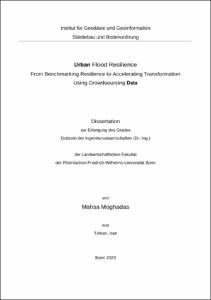Moghadas, Mahsa: Urban Flood Resilience : From Benchmarking Resilience to Accelerating Transformation Using Crowdsourcing Data. - Bonn, 2023. - Dissertation, Rheinische Friedrich-Wilhelms-Universität Bonn.
Online-Ausgabe in bonndoc: https://nbn-resolving.org/urn:nbn:de:hbz:5-69728
Online-Ausgabe in bonndoc: https://nbn-resolving.org/urn:nbn:de:hbz:5-69728
@phdthesis{handle:20.500.11811/10657,
urn: https://nbn-resolving.org/urn:nbn:de:hbz:5-69728,
author = {{Mahsa Moghadas}},
title = {Urban Flood Resilience : From Benchmarking Resilience to Accelerating Transformation Using Crowdsourcing Data},
school = {Rheinische Friedrich-Wilhelms-Universität Bonn},
year = 2023,
month = feb,
note = {This thesis represents a significant contribution to the field of disaster resilience in the context of flood hazards in Iran and Germany. In the face of increasingly unpredictable climate-related extreme events, it is imperative to integrate good governance and sociotechnical advances and empower people to develop transformative, collaborative, and innovative approaches to resilience. The thesis makes three important contributions to developing, testing, and improving methods for assessing and strengthening resilience to flooding:
First, from an idiographic or top-down perspective, to operationalize the concept of disaster resilience as an important milestone for better-understanding resilience characteristics. The first contribution presents a multi-criteria approach (composite indicator building) to develop a resilience index for benchmarking flood resilience, and a hybrid multi-criteria decision-making method (AHP-TOPSIS) to comparatively assess the level of flood resilience in Tehran, Iran.
Second, for linking top-down and bottom-up approaches to enable change in disaster resilience, a comprehensive framework for scaling transformative urban resilience through crowdsourcing and Volunteered Geographic Information (VGI) is proposed. Key legal, institutional, social, economic, and technical issues are identified to formalize the process of adopting these new data sources in resilience initiatives.
Third, from a nomothetic or bottom-up perspective, semantic (LDA) and spatiotemporal (KDE) analyses of social media crowdsourcing (Twitter) and an online survey are applied to analyze the 2021 flood in Germany and incorporate collective intelligence into disaster resilience studies. The real-time collective sensing approach reflects the optimized diversity and a spectrum of people's experiences and knowledge related to flood disasters and highlights the sociocultural characteristics of communities. This approach could also be an alternative to traditional participatory techniques to enable real-time situational awareness and unfolding of such events at a fraction of the cost to inform disaster resilience initiatives.
This work, therefore, provides innovative approaches and data to support disaster resilience initiatives. The integrated framework and multidisciplinary methodology provide a solid foundation for future research in this area, contributing to a more resilient future where policy, people, and technology work harmoniously to address challenges and create evidence-based solutions in a place-based, inclusive, and forward-looking manner.},
url = {https://hdl.handle.net/20.500.11811/10657}
}
urn: https://nbn-resolving.org/urn:nbn:de:hbz:5-69728,
author = {{Mahsa Moghadas}},
title = {Urban Flood Resilience : From Benchmarking Resilience to Accelerating Transformation Using Crowdsourcing Data},
school = {Rheinische Friedrich-Wilhelms-Universität Bonn},
year = 2023,
month = feb,
note = {This thesis represents a significant contribution to the field of disaster resilience in the context of flood hazards in Iran and Germany. In the face of increasingly unpredictable climate-related extreme events, it is imperative to integrate good governance and sociotechnical advances and empower people to develop transformative, collaborative, and innovative approaches to resilience. The thesis makes three important contributions to developing, testing, and improving methods for assessing and strengthening resilience to flooding:
First, from an idiographic or top-down perspective, to operationalize the concept of disaster resilience as an important milestone for better-understanding resilience characteristics. The first contribution presents a multi-criteria approach (composite indicator building) to develop a resilience index for benchmarking flood resilience, and a hybrid multi-criteria decision-making method (AHP-TOPSIS) to comparatively assess the level of flood resilience in Tehran, Iran.
Second, for linking top-down and bottom-up approaches to enable change in disaster resilience, a comprehensive framework for scaling transformative urban resilience through crowdsourcing and Volunteered Geographic Information (VGI) is proposed. Key legal, institutional, social, economic, and technical issues are identified to formalize the process of adopting these new data sources in resilience initiatives.
Third, from a nomothetic or bottom-up perspective, semantic (LDA) and spatiotemporal (KDE) analyses of social media crowdsourcing (Twitter) and an online survey are applied to analyze the 2021 flood in Germany and incorporate collective intelligence into disaster resilience studies. The real-time collective sensing approach reflects the optimized diversity and a spectrum of people's experiences and knowledge related to flood disasters and highlights the sociocultural characteristics of communities. This approach could also be an alternative to traditional participatory techniques to enable real-time situational awareness and unfolding of such events at a fraction of the cost to inform disaster resilience initiatives.
This work, therefore, provides innovative approaches and data to support disaster resilience initiatives. The integrated framework and multidisciplinary methodology provide a solid foundation for future research in this area, contributing to a more resilient future where policy, people, and technology work harmoniously to address challenges and create evidence-based solutions in a place-based, inclusive, and forward-looking manner.},
url = {https://hdl.handle.net/20.500.11811/10657}
}






